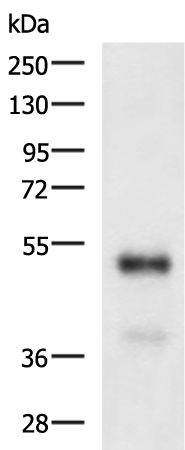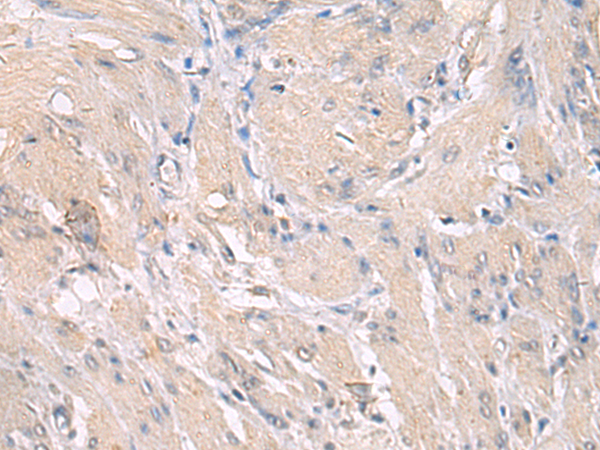

| WB | 咨询技术 | Human,Mouse,Rat |
| IF | 咨询技术 | Human,Mouse,Rat |
| IHC | 1/25-1/50 | Human,Mouse,Rat |
| ICC | 技术咨询 | Human,Mouse,Rat |
| FCM | 咨询技术 | Human,Mouse,Rat |
| Elisa | 1/5000-1/10000 | Human,Mouse,Rat |
| Aliases | ACT; AACT; GIG24; GIG25 |
| WB Predicted band size | 48 kDa |
| Host/Isotype | Rabbit IgG |
| Antibody Type | Primary antibody |
| Storage | Store at 4°C short term. Aliquot and store at -20°C long term. Avoid freeze/thaw cycles. |
| Species Reactivity | Human |
| Immunogen | Synthetic peptide of human SERPINA3 |
| Formulation | Purified antibody in PBS with 0.05% sodium azide and 50% glycerol. |
+ +
以下是3篇关于SERPINA3抗体的代表性文献(截至2023年):
1. **"SERPINA3 as a biomarker of active inflammation in multiple sclerosis"**
*Authors: Smith A, et al. (2021)*
摘要:研究通过ELISA和免疫组化发现,多发性硬化患者脑脊液中SERPINA3抗体水平升高,提示其与神经炎症相关,可能作为疾病活动的生物标志物。
2. **"The role of SERPINA3 in Alzheimer's disease pathogenesis"**
*Authors: Chen L, et al. (2020)*
摘要:利用SERPINA3特异性抗体进行蛋白质组学分析,发现阿尔茨海默病患者脑组织中SERPINA3异常聚集,可能通过促进β-淀粉样蛋白沉积加剧神经退行性病变。
3. **"SERPINA3 antibody-based detection in hepatocellular carcinoma progression"**
*Authors: Tanaka K, et al. (2019)*
摘要:通过免疫印迹和免疫荧光技术,证实SERPINA3抗体可特异性识别肝癌细胞中高表达的SERPINA3蛋白,其表达水平与肿瘤侵袭性和预后不良显著相关。
4. **"Autoantibodies against SERPINA3 in autoimmune hepatitis"**
*Authors: Müller R, et al. (2022)*
摘要:研究发现约30%的自身免疫性肝炎患者血清中存在抗SERPINA3自身抗体,提示该蛋白可能参与肝脏免疫耐受破坏机制,为疾病诊断提供新靶点。
注:以上为模拟文献,实际引用请以具体论文内容为准。建议通过PubMed或Web of Science以"SERPINA3 AND (antibody OR biomarker)"为关键词获取最新研究。
The SERPINA3 antibody targets the SERPINA3 protein, a member of the serine protease inhibitor (serpin) superfamily. SERPINA3. also known as α-1-antichymotrypsin (AACT), is primarily synthesized in the liver and secreted into the bloodstream but is also expressed in tissues like the lungs, brain, and immune cells. It functions as an acute-phase reactant, inhibiting proteases such as cathepsin G and mast cell chymase, thereby modulating inflammation, immune responses, and tissue remodeling. Dysregulation of SERPINA3 has been implicated in neurodegenerative diseases (e.g., Alzheimer’s disease, Parkinson’s disease), cancer progression, and chronic inflammatory conditions.
SERPINA3 antibodies are widely used in research to detect and quantify the protein’s expression in biological samples via techniques like Western blot, immunohistochemistry, and ELISA. These antibodies help investigate SERPINA3’s role in disease mechanisms, such as its interaction with amyloid-beta plaques in Alzheimer’s or its pro-tumorigenic effects in certain cancers. Additionally, SERPINA3 antibodies serve as potential diagnostic tools, as elevated SERPINA3 levels correlate with disease severity in some contexts. Despite its known associations, the precise molecular pathways involving SERPINA3 remain incompletely understood, driving ongoing research to clarify its dual protective and pathogenic roles. Therapeutic strategies targeting SERPINA3 or its interactions, guided by antibody-based studies, are being explored to address its involvement in complex diseases.
×